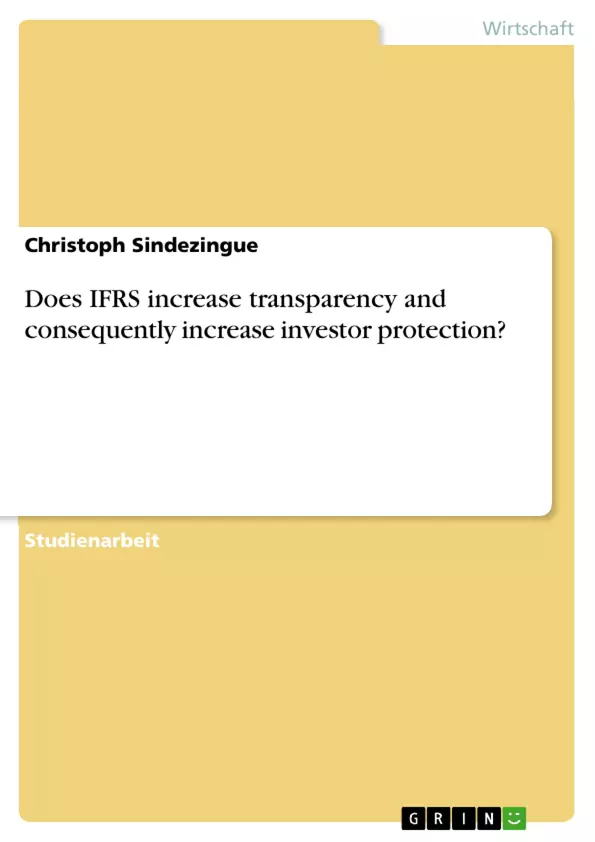Since 2005, the disclosure of consolidated financial statements according to IFRS has been mandatory for all listed companies in the European Union. IFRS supporters claim that a single accounting standard would increase the level of disclosure and hence, increase transparency and therefore investor protection. This paper strives to determine if IFRS increases investor protection through improvements in reporting transparency. Therefore, this paper focuses on the ability of IFRS to decrease earnings management, the main driver of investor protection.
The theoretical rationale gives an overview of earnings management, revealing its popularity among management. However, irrespective of the motivation, earnings management reduces the transparency for the investor and thereby reduces investor protection. The review of empirical evidence reveals that voluntary adoption of IFRS leads to a strong decrease in earnings management and an increase in disclosure quality of financial statements. Indeed, the voluntary adoption is biased because the first-time adopters are convinced that a higher transparency could be used to their own advantage. In contrast, the mandatory adoption is not free of ambiguity, but literature tends to conclude that the forced implementation of IFRS leads neither to a reduction of earnings management nor to a higher level of disclosure. Consequently, a mandatory IFRS adoption does not necessarily increase investor protection.
Inhaltsverzeichnis
- Executive Summary
- Introduction
- Theoretical rationale: Earnings management
- Techniques and effects
- Reasons for use of earnings management
- Empirical Evidence: earnings management and investor protection under IFRS
- Prior adoption of IFRS
- Voluntary adoption of IFRS
- Mandatory adoption of IFRS
- Summary and conclusion
Zielsetzung und Themenschwerpunkte
Diese Arbeit zielt darauf ab, zu ermitteln, ob IFRS den Anlegerschutz durch verbesserte Transparenz in der Berichterstattung erhöht. Daher konzentriert sich diese Arbeit auf die Fähigkeit von IFRS, das Ergebnismanagement zu verringern, den Haupttreiber des Anlegerschutzes.
- Analyse der Auswirkungen von IFRS auf die Transparenz der Finanzberichterstattung
- Beurteilung des Einflusses von IFRS auf das Ergebnismanagement
- Untersuchung des Zusammenhangs zwischen IFRS und dem Schutz der Anlegerinteressen
- Bewertung der empirischen Evidenz zur freiwilligen und obligatorischen Einführung von IFRS
- Identifizierung der Herausforderungen und Chancen bei der Implementierung von IFRS
Zusammenfassung der Kapitel
- Introduction: Die Einführung beleuchtet die wachsende Bedeutung von IFRS und die Diskussion um die Verbesserung der Transparenz und des Anlegerschutzes.
- Theoretical rationale: Earnings management: Dieses Kapitel erläutert das Ergebnismanagement als ein zentrales Thema im Kontext von IFRS und analysiert die Techniken und Gründe für dessen Anwendung.
- Empirical Evidence: earnings management and investor protection under IFRS: Dieses Kapitel befasst sich mit der empirischen Evidenz zum Einfluss von IFRS auf das Ergebnismanagement und den Anlegerschutz. Es werden sowohl freiwillige als auch obligatorische Einführungen von IFRS betrachtet.
Schlüsselwörter
IFRS, Ergebnismanagement, Transparenz, Offenlegung, Anlegerschutz, Forschungsmethoden in Wirtschaft und Finanzen.
Häufig gestellte Fragen
Erhöht die Einführung von IFRS tatsächlich den Anlegerschutz?
Befürworter behaupten dies, da ein einheitlicher Standard die Transparenz erhöhen soll. Die Arbeit zeigt jedoch, dass eine verpflichtende Einführung nicht zwingend zu besserem Schutz führt.
Was ist "Earnings Management" (Ergebnismanagement)?
Es bezeichnet Techniken der Bilanzgestaltung, um die finanzielle Lage eines Unternehmens positiver darzustellen, was die Transparenz für Anleger verringert.
Wie wirkt sich die freiwillige gegenüber der verpflichtenden IFRS-Einführung aus?
Freiwillige Anwender reduzieren Ergebnismanagement oft stark, da sie Transparenz als Vorteil nutzen wollen. Bei verpflichtender Einführung bleibt dieser Effekt oft aus.
Seit wann sind IFRS für börsennotierte Unternehmen in der EU verpflichtend?
Die Erstellung von konsolidierten Abschlüssen nach IFRS ist für alle gelisteten Unternehmen in der EU seit dem Jahr 2005 obligatorisch.
Was ist der Haupttreiber für den Anlegerschutz im Reporting?
Der Haupttreiber ist die Verringerung von Ergebnismanagement und die Erhöhung der Offenlegungsqualität in den Finanzberichten.
- Arbeit zitieren
- MSc, BA Christoph Sindezingue (Autor:in), 2010, Does IFRS increase transparency and consequently increase investor protection?, München, GRIN Verlag, https://www.grin.com/document/161689



